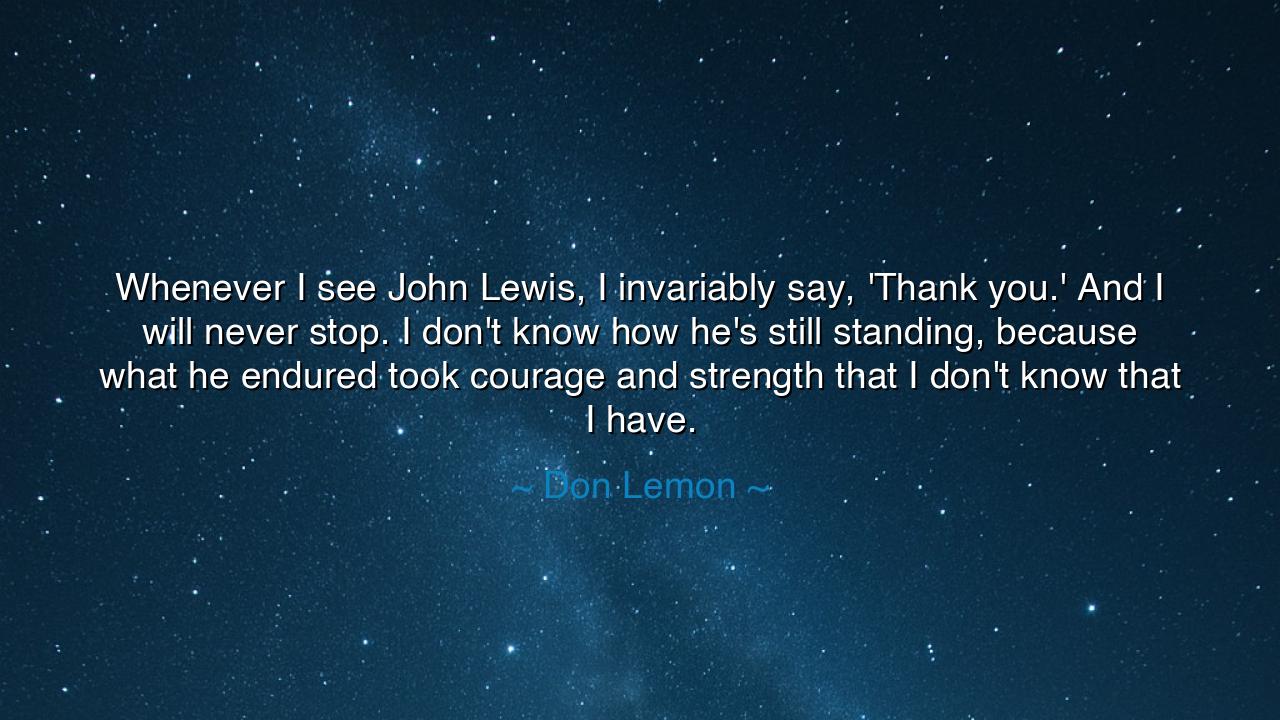
Whenever I see John Lewis, I invariably say, 'Thank you.' And I
Whenever I see John Lewis, I invariably say, 'Thank you.' And I will never stop. I don't know how he's still standing, because what he endured took courage and strength that I don't know that I have.






Don Lemon once said with reverence and humility: “Whenever I see John Lewis, I invariably say, ‘Thank you.’ And I will never stop. I don’t know how he’s still standing, because what he endured took courage and strength that I don’t know that I have.” In these words lies the voice of one who stands in awe before a living monument of endurance. Lemon does not speak as a man above history but as a witness to it, acknowledging that the price of freedom and dignity was borne by others long before his own day. His repeated thank you is not mere politeness; it is the cry of a generation to one of its guardians, a recognition that their own lives are built upon his suffering.
The origin of this gratitude lies in the life of John Lewis himself. From the segregated South, he rose to become one of the fiercest champions of civil rights. He marched across the Edmund Pettus Bridge in Selma in 1965, where he was beaten nearly to death for daring to demand the right to vote. He endured jails, threats, and humiliation, yet never gave up. His body bore the scars of injustice, but his spirit remained unbroken. This is why Lemon marvels, “I don’t know how he’s still standing.” For to endure such trials without surrender requires not ordinary courage but a strength of soul so great it seems almost otherworldly.
The ancients would have named such a man among the heroes. For as Achilles fought with the sword, John Lewis fought with the unyielding conviction of the spirit. Where others might have sought revenge, he chose nonviolence. Where others might have yielded to despair, he clung to hope. His strength was not of the arm but of the heart, and in that strength lies a lesson that transcends time. It is the same spirit that animated Socrates to drink the hemlock rather than betray truth, and that carried early martyrs through flames and prisons, unbowed before the powers of their day.
Lemon’s awe reveals another truth: that we, who live in times shaped by the sacrifices of others, may often feel unworthy of their legacy. He admits, “I don’t know that I have that courage.” This is not weakness, but honesty. For it is right to acknowledge the greatness of those who bore more than we can imagine. Yet in honoring them, we inherit their fire. Just as students carry forward the teachings of their masters, so too must we carry forward the legacy of those who stood unbroken for justice. Gratitude is the beginning, but action is the continuation.
History offers many examples of people who gave thanks to their forerunners. When Abraham Lincoln spoke at Gettysburg, he acknowledged that the living could not consecrate the ground as the dead already had. Their sacrifice had made it sacred, and the living could only rededicate themselves to finishing the work they began. Lemon’s words are of the same spirit. By saying “thank you” to John Lewis, he consecrates the present with remembrance of the past and reminds us that gratitude must lead to renewed struggle for justice.
The lesson is clear: give thanks to those who have endured for your sake, but do not let your thanks end with words. Let gratitude stir you to courage, for though you may feel you lack the strength, the very memory of those who suffered before you can awaken it. Each time you whisper “thank you,” let it be a vow to walk a little further on the path they cleared, to stand a little firmer against the winds they once faced.
So let Don Lemon’s testimony be remembered: that to see a man like John Lewis is to behold the living proof of courage, the embodiment of strength that no chains or blows could break. Say “thank you” to such people, often and without ceasing. But also take their spirit into yourself. For their courage was not meant to end with them—it was meant to awaken in you, so that future generations will look upon your deeds and, in turn, say with reverence and humility: “Thank you.”






AAdministratorAdministrator
Welcome, honored guests. Please leave a comment, we will respond soon